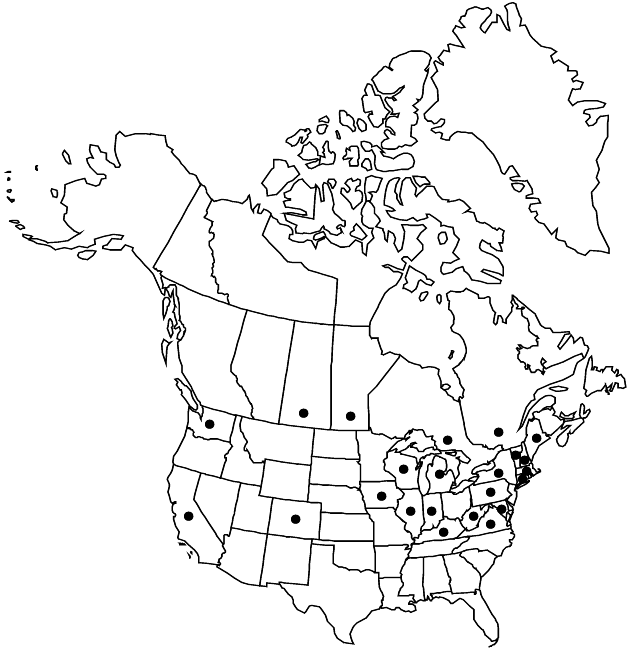Difference between revisions of "Echinops sphaerocephalus"
Sp. Pl. 2: 814. 1753.
FNA>Volume Importer |
imported>Volume Importer |
||
| (2 intermediate revisions by 2 users not shown) | |||
| Line 8: | Line 8: | ||
}} | }} | ||
|common_names=Great globe-thistle;boulette commune | |common_names=Great globe-thistle;boulette commune | ||
| + | |special_status={{Treatment/ID/Special_status | ||
| + | |code=I | ||
| + | |label=Introduced | ||
| + | }} | ||
|basionyms= | |basionyms= | ||
|synonyms= | |synonyms= | ||
| Line 24: | Line 28: | ||
|elevation=0–1700 m | |elevation=0–1700 m | ||
|distribution=Man.;Ont.;Que.;Sask.;Calif.;Colo.;Conn.;Ill.;Ind.;Iowa;Ky.;Maine;Md.;Mass.;Mich.;N.H.;N.Y.;Pa.;Vt.;Va.;Wash.;W.Va.;Wis.;Eurasia. | |distribution=Man.;Ont.;Que.;Sask.;Calif.;Colo.;Conn.;Ill.;Ind.;Iowa;Ky.;Maine;Md.;Mass.;Mich.;N.H.;N.Y.;Pa.;Vt.;Va.;Wash.;W.Va.;Wis.;Eurasia. | ||
| + | |introduced=true | ||
|discussion=<p><i>Echinops sphaerocephalus</i> is sometimes cultivated, and sometimes it escapes from cultivation. The species has been reported from Saskatchewan and may be introduced there; that appears questionable.</p> | |discussion=<p><i>Echinops sphaerocephalus</i> is sometimes cultivated, and sometimes it escapes from cultivation. The species has been reported from Saskatchewan and may be introduced there; that appears questionable.</p> | ||
|tables= | |tables= | ||
| Line 47: | Line 52: | ||
|publication title=Sp. Pl. | |publication title=Sp. Pl. | ||
|publication year=1753 | |publication year=1753 | ||
| − | |special status= | + | |special status=Introduced |
| − | |source xml=https:// | + | |source xml=https://bitbucket.org/aafc-mbb/fna-data-curation/src/2e0870ddd59836b60bcf96646a41e87ea5a5943a/coarse_grained_fna_xml/V19-20-21/V19_30.xml |
|tribe=Asteraceae tribe Cardueae | |tribe=Asteraceae tribe Cardueae | ||
|genus=Echinops | |genus=Echinops | ||
Latest revision as of 19:50, 5 November 2020
Plants 100–200 cm. Stems simple to much branched, ± glandular, ± tomentose. Leaves: basal and proximal cauline leaves shortly winged-petiolate, distal cauline sessile, clasping; blades oblong-elliptic to narrowly obovate, margins ± subentire or 1–2-pinnately lobed, lobes lanceolate to triangular, margins revolute, spiny-dentate, spine-tipped, spines slender, 2–4 mm; abaxial faces densely gray- or white-tomentose, adaxial faces green, glandular-scabrous. Secondary heads 3–6 cm diam. Involucres 15–25 mm. Outer phyllaries ± glandular, inner phyllary apices attenuate, expanded, fringed. Corollas white to pale blue, 12–14 mm, tube ca. 5.5 mm, lobes ca. 7 mm. Cypselae 7–10 mm; pappi of ± connate, ciliate scales 1–1.5 mm. 2n = 30, 32.
Phenology: Flowering summer (Jun–Aug).
Habitat: Disturbed sites
Elevation: 0–1700 m
Distribution

Introduced; Man., Ont., Que., Sask., Calif., Colo., Conn., Ill., Ind., Iowa, Ky., Maine, Md., Mass., Mich., N.H., N.Y., Pa., Vt., Va., Wash., W.Va., Wis., Eurasia.
Discussion
Echinops sphaerocephalus is sometimes cultivated, and sometimes it escapes from cultivation. The species has been reported from Saskatchewan and may be introduced there; that appears questionable.
Selected References
None.